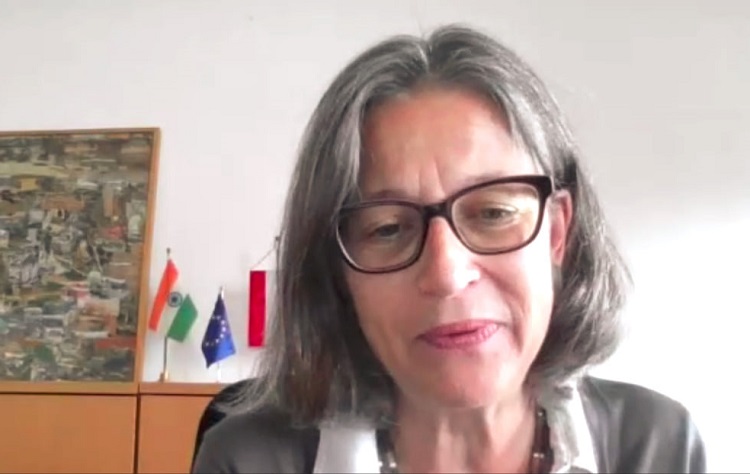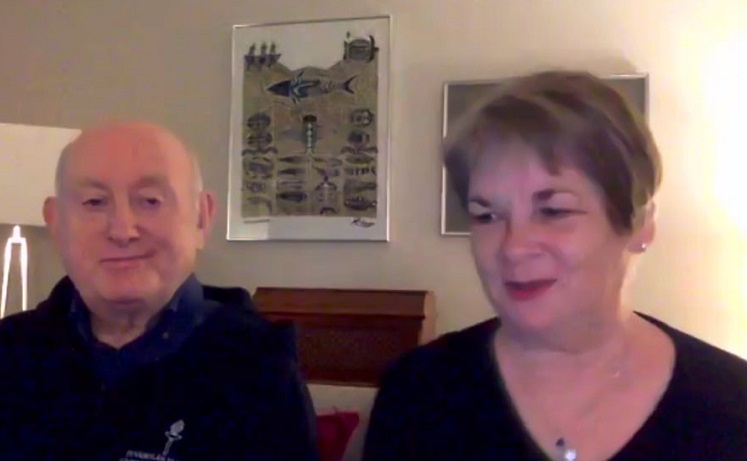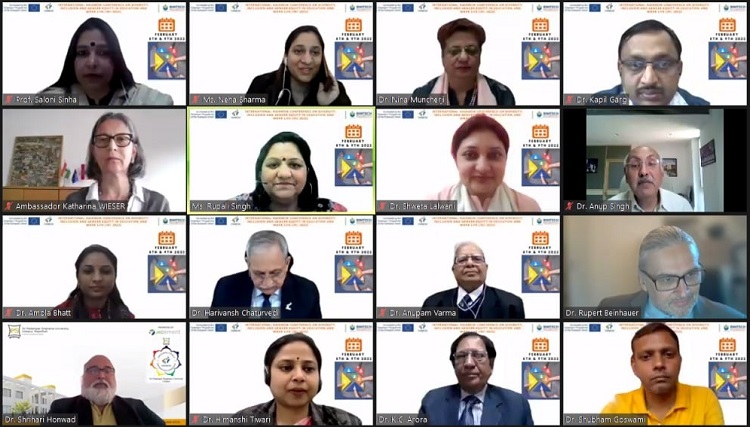Gender Equality key to meet future challenges, opine Experts at BIMTECH’s International Rainbow Conference

Greater Noida, February 8: Birla Institute of Management Technology (BIMTECH) on Tuesday opened the two-day International Rainbow Conference (IRC 2022) on Diversity, inclusion, gender equality in education & work-life.
This conference is a dissemination event under BIMTECH’s Project Rainbow, co-funded by the Erasmus Plus program of the European Union.
The chief guest of IRC 2022 was Ambassador Katharina WIESER, Ambassador of the Republic of Austria to India, Bangladesh, Bhutan, Maldives, Nepal & Sri Lanka. Ambassador Katharina delivered her address on ‘Diversity, Inclusion and Gender Equity: Lessons from EU Countries with special reference to Austria.’
Katharina briefed, “The EU has various instruments in place such as the EU gender equality strategy, Gender Action Plan III, setting up the road map towards a gender-equal world; it focuses on six key areas of engagement.”
She highlighted that within the EU, they have underlined common core principles & values that they are trying to achieve through common projects & strategies.

“Regular monitoring brings to light the status of each member state in various areas such as work, money, power, knowledge, health at the time.”
Katharina said, in Austria, we have very high standards regarding Gender Equality.
She said, “Through various initiatives & projects, the Austrian government is trying to address existing inequalities & problems. There are Programmes, for example, to enhance female representation in various study areas like mint subjects & professions, which traditionally were studied by men.
She said, “Family care responsibilities is a big issue in all societies, we in Austria have child care institutions but still it is a challenge to combine family & work.”
“I think to deal successfully with the challenges ahead, we need full equality & empowerment in all parts of society,” Katherina asserted.
Dr. Jean Helms Mills , Professor of Management (Emerita) at Saint Mary’s University Canada & Dr. Albert J. Mills
Professor of Management (Emeritus) at Saint Mary’s University Canada delivered keynote address on “Making Sense of Gender Equity, Diversity & Inclusion”.
In their address, they talked about critical sensemaking, a notion which they sight as a heuristic to explore various organisational outcomes.
”In particular, we have used it (critical sense-making) to look at discrimination practices at work. We see critical sense making as a very good way to explore the set of discriminatory practices & how they work,” Dr. Jean said.
Briefing on the story about how he got into critical sense making along with Dr Albert J. Mills, Dr. Jean said, “I worked for the Airline Industry for 17 years & had an interest in it, so in doing my thesis I was looking for a theoretical framework and while in the process, I came across the work of Karl weick on critical sense making and while doing the process I came across the work of Albert Mills and then we came up with a notion of sense making overtime & started to look at the Airline work.”

In the Keynote address presentation, they defined critical sense making, its roots & importance, as well as key aspects & applications of critical sense making.
Giving an overview of critical sense making (CSM), Dr. Jean said, “It is the study of the socio-psychological process & the structural contexts through which discriminatory senses of the organization are produced.”
Talking about plausibility, an important sense making property, Dr. Albert J. Mills said, ”I think that plausibility is the key to social change, it’s really the most important sense making aspect.”
Earlier during the conference, Dr. Harivansh Chaturvedi, Director, BIMTECH, in his address highlighted the importance of diversity, inclusion, gender equality in education & work-life.
“It is not only a fundamental human right but a necessary foundation for peaceful, prosperous and sustainable world; women’s equality & empowerment is one of the seventeen sustainable development goals,” said Dr. Chaturvedi.
“Gender equality by 2030 requires urgent action to eliminate many root causes of discrimination that curtail women’s rights in private & public spheres,” Dr. Chaturvedi added.
Referring to the Annual Report on Global Gender Gap by the World Economic Forum, Dr. Chaturvedi said that the gender gap in India has widened to 62.5% & now India has emerged as one of the worst performers in South Asia on the 2021 Global Gender Gap Report ranking at 140 out of 156 countries.
“This conference will give us the opportunity to find solutions to all these problems & it can give us a roadmap for the future when women from India can work with equal privileges, rights, remuneration in all workspaces.” he stated.
IRC 2022 has brought together academics, practioners & decision-makers for fruitful discussion on issues related to the theme.
There are a total of six partners in the project, the partners of the project along with BIMTECH itself include two Indian universities & three overseas educational institutions, these are: FH JOANNEUM (Austria), University of Jyvaskyla School of Business and Economics (Finland), Nirma University (Ahmedabad, India), Sir Padampat Singhania University (Udaipur, India), International Consulting and Mobility Agency SL (INCOMA) (Spain).


